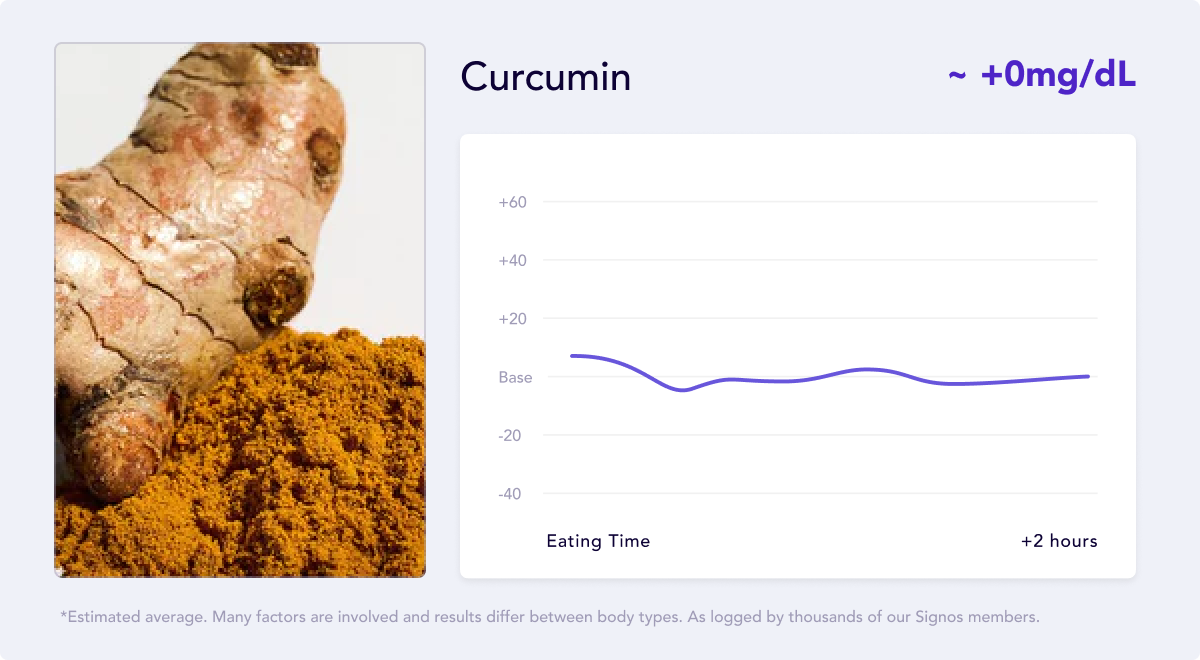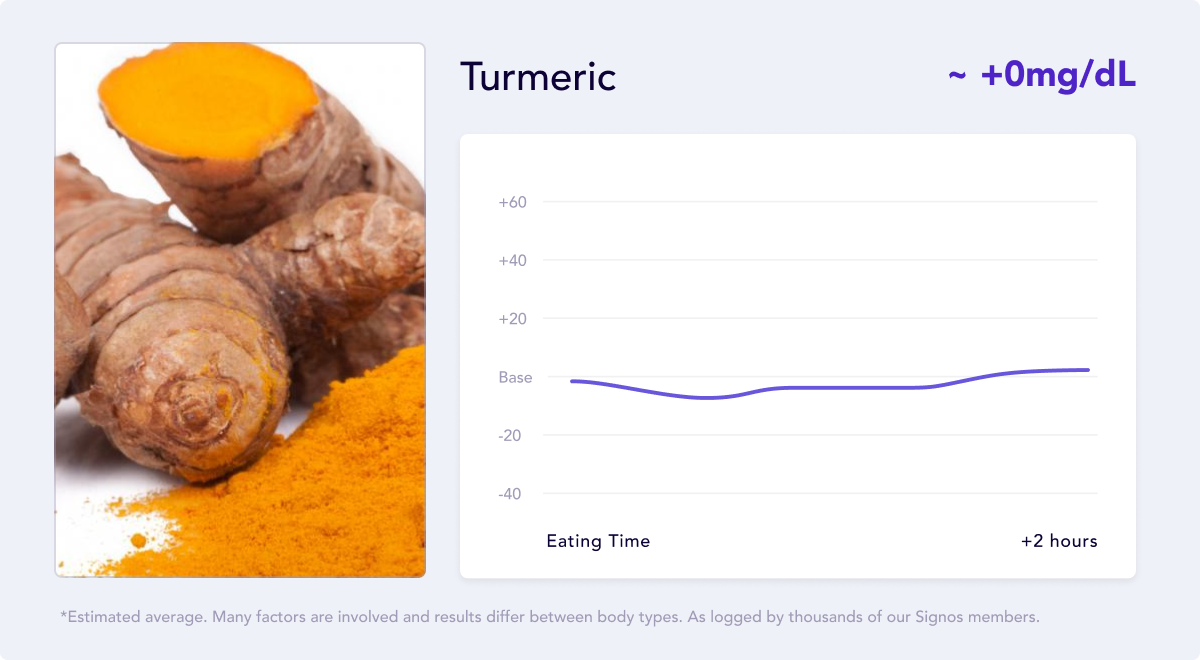Curcumin vs. Turmeric Explained


Curcumin and turmeric are two terms often used interchangeably to refer to the same thing; however, there are core differences between the two.
Turmeric, also known as the golden spice, is a main ingredient in curries and is found in Asian cuisines.
Turmeric has also been used in traditional Eastern medicine in both India and Asia to treat many health conditions, including skin and digestive issues. It contains the active phytonutrient curcumin and bisdemethoxycurcumin, both of which have anti-inflammatory and antioxidant properties.
In this article, we’ll discuss the differences between curcumin and turmeric and their bioavailability and nutritional benefits.

Discover how your body responds to what you eat, and make small changes to hit your health goals
View PlansWhat Is the Difference Between Curcumin and Turmeric?
Turmeric is a spice derived from the root of the Curcuma longa plant and is commonly used in Indian cooking. Dried turmeric is often sold in jars but can be purchased fresh as turmeric root, which looks similar to ginger root but has a more intense golden yellow color.
Turmeric contains several plant substances and curcuminoids. Curcumin is one of these bioactive compounds found within turmeric. It is responsible for the spice's intense color and is known for its potent anti-inflammatory and antioxidant properties. Curcumin is a part of turmeric but contains a broader range of plant compounds beyond curcumin.
Both curcumin and turmeric offer unique health benefits when consumed regularly. As a whole, spice, turmeric and turmeric supplements contribute not only curcumin but also other bioactive compounds that may benefit health. On the other hand, curcumin supplements provide a concentrated dose of this specific compound, making it easier to receive the health benefits specific to this phytochemical.
Curcumin vs. Turmeric: Benefits
Both curcumin and Turmeric have medicinal properties that may provide several health benefits and improve wellness:
- Osteoarthritis Symptoms Relief: Double-blind, randomized controlled trials have shown compounds in turmeric, including curcumin, can reduce markers of inflammation and relieve painful symptoms of osteoarthritis and rheumatoid arthritis.1, 9
- May Help Regulate Body Fat: Turmeric and curcumin may inhibit the inflammatory pathway involved in obesity and may help regulate body fat.2
- Reduce Harmful Oxidative Stress: The anti-inflammatory properties and antioxidant compounds found in turmeric can help fight free radicals, reducing inflammation and oxidative stress. Inflammation and oxidative stress are known risk factors for heart disease and abnormal cholesterol levels.3
- Improve Blood Sugar Metabolism: Turmeric and curcumin can improve blood sugar metabolism and potentially reduce the effects of diabetes on your body.4
- Boost Fungal Medication: Turmeric and curcumin can disrupt fungal cell membranes and could be used in conjunction with fungal medication for better outcomes.5, 6
- Reduce the Development of Bacteria That Might Cause Diseases: Turmeric and curcumin have strong antibacterial effects. They can reduce the growth of many disease-causing bacteria.6
- Might Reduce the Activity of Cancerous Cells: Though research is still in its early stages, turmeric and curcumin may reduce the activity of colon and other cancer cells. Some studies suggest that curcumin may prevent tumor growth in breast cancer.7,10
Which Is Better: Turmeric or Curcumin?
There has yet to be a clear consensus on whether turmeric or curcumin is better. Most studies that have shown beneficial effects have used extracted turmeric with a high concentration of curcumin or curcumin alone.
Turmeric contains curcumin and various other bioactive compounds with potential health benefits. However, curcumin supplements provide a concentrated dose of this specific compound, which may be particularly beneficial for targeted health goals.
Research shows that the phytochemical curcumin has powerful anti-inflammatory and antioxidant properties, increasing its potential to improve health concerns that involve inflammation.2, 3, 4
The one you should choose depends on the benefits you hope to gain and the symptoms or ailments you hope to treat.
Turmeric contains several plant compounds with antioxidant, anti-inflammatory, and antimicrobial activities that work better together.
Curcumin’s potent antioxidant and anti-inflammatory effects may benefit people with diabetes and osteoporosis, but its absorption can be poor. Combining curcumin with piperine in black pepper can significantly improve absorption.
When buying supplements, it’s important to look for a formula that has been clinically tested and proven to be well absorbed.
Nutrition
While turmeric and curcumin supplements can benefit health, their nutritional makeup differs slightly.
Turmeric is a more complete form of curcumin, providing more nutrients than curcumin.
Glycemic Index
The glycemic index (GI) provides information about how certain foods affect blood glucose. Both turmeric and curcumin have minimal carbohydrates, which results in a negligible effect on blood sugar. Curcumin, being an isolated compound, generally has a low glycemic index, meaning it has a minimal impact on blood sugar. Turmeric, in its natural form, also exhibits a low GI.


Vitamins
Turmeric contains vitamin C, vitamin B6, vitamin K, and folate, while curcumin contains only vitamin B6. Below is the vitamin content found in 2 tbsp of curcumin vs. turmeric:

Discover how your body responds to what you eat, and make small changes to hit your health goals
View PlansReferences
- Akuri, M. C., Barbalho, S. M., Val, R. M., & Guiguer, E. L. (2017). Reflections about Osteoarthritis and Curcuma longa. Pharmacognosy reviews, 11(21), 8–12. https://doi.org/10.4103/phrev.phrev_54_16
- Bradford P. G. (2013). Curcumin and obesity. BioFactors (Oxford, England), 39(1), 78–87. https://doi.org/10.1002/biof.1074
- Lee, H. Y., Kim, S. W., Lee, G. H., Choi, M. K., Jung, H. W., Kim, Y. J., Kwon, H. J., & Chae, H. J. (2016). Turmeric extract and its active compound, curcumin, protect against chronic CCl4-induced liver damage by enhancing antioxidation. BMC complementary and alternative medicine, 16(1), 316. https://doi.org/10.1186/s12906-016-1307-6
- Maithili Karpaga Selvi, N., Sridhar, M. G., Swaminathan, R. P., & Sripradha, R. (2015). Efficacy of Turmeric as Adjuvant Therapy in Type 2 Diabetic Patients. Indian journal of clinical biochemistry : IJCB, 30(2), 180–186. https://doi.org/10.1007/s12291-014-0436-2
- Chen, C., Long, L., Zhang, F., Chen, Q., Chen, C., Yu, X., Liu, Q., Bao, J., & Long, Z. (2018). Antifungal activity, main active components and mechanism of Curcuma longa extract against Fusarium graminearum. PloS one, 13(3), e0194284. https://doi.org/10.1371/journal.pone.0194284
- Moghadamtousi, S. Z., Kadir, H. A., Hassandarvish, P., Tajik, H., Abubakar, S., & Zandi, K. (2014). A review on antibacterial, antiviral, and antifungal activity of curcumin. BioMed research international, 2014, 186864. https://doi.org/10.1155/2014/186864
- Kuttan, R., Bhanumathy, P., Nirmala, K., & George, M. C. (1985). Potential anticancer activity of turmeric (Curcuma longa). Cancer letters, 29(2), 197–202. https://doi.org/10.1016/0304-3835(85)90159-4
- Daily, J. W., Yang, M., & Park, S. (2016). Efficacy of Turmeric Extracts and Curcumin for Alleviating the Symptoms of Joint Arthritis: A Systematic Review and Meta-Analysis of Randomized Clinical Trials. Journal of medicinal food, 19(8), 717–729. https://doi.org/10.1089/jmf.2016.3705
- Thanawala, S., Shah, R., Somepalli, V., Alluri, K. V., Desomayanandam, P., & Bhuvanendran, A. (2021). A Multicenter, Randomized, Double-Blind, Placebo-Controlled Trial Assessing Efficacy and Safety of a Novel Low-Dose Turmeric Extract Formulation in Healthy Adults with Chronic Knee Pain. Clinical pharmacology : advances and applications, 13, 91–100. https://doi.org/10.2147/CPAA.S307464
- Cao, X., Li, Y., Wang, Y., Yu, T., Zhu, C., Zhang, X., & Guan, J. (2022). Curcumin suppresses tumorigenesis by ferroptosis in breast cancer. PloS one, 17(1), e0261370. https://doi.org/10.1371/journal.pone.0261370
Frequently Asked Questions
Who Should Not Take Curcumin?
Individuals with gallbladder issues or those on blood-thinning medications should consult their healthcare provider before taking curcumin supplements.
Is It Ok to Take Curcumin Every Day?
For most people, taking curcumin daily is safe and without side effects and may offer health benefits. However, it's advisable to consult with a healthcare professional to determine the appropriate dosage.
Is Curcumin Toxic to the Liver?
While curcumin is generally considered safe, excessive doses may lead to liver issues. Individuals with liver conditions should consult their healthcare provider before taking curcumin supplements.
What Foods Are High in Curcumin?
Turmeric and curcumin are commonly found in curry dishes. Adding turmeric to soups, stews, and smoothies can be an excellent way to incorporate it into your diet.

